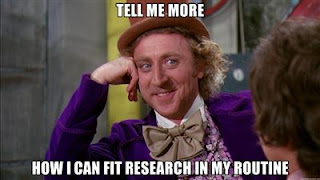 |  |
Suzana Sukovic
These two pictures have been recently posted on the LARK Facebook page. They reflect how I often feel about research. There are times when research is on top of my ‘to do list’, but it doesn’t get done -- and times when I give up even putting it on the list. There are times when I ask people how they do it and times when I am completely with Willy Wonka. Despite a popular belief that librarians sit in peace and quiet reading novels, we are busy all the time. If we have to do one more thing, it has to be something involving our clients or projects with pressing schedules.
But, research isn’t one more thing. Research is THE thing. Reminders come in flashes by doing research.
Data are beautiful
Like many students who get the job done just before the assignment is due, I have recently revisited my neglected research data in order to meet fast approaching presentation deadlines. I still had enough time to stop and give data a proper look...And then there was a flash moment. I remembered how beautiful and meaningful data are, especially emerging from the dark recesses of drawers. My ethnographic notes reminded me how easy it is to forget key details and how important it is to keep track of reasons why you think your project was successful (or otherwise). There is a good reason why we should stick with methodology and go beyond our impression that something worked or didn’t work.That quiet space
Staying with data for a while opens a quiet space for analysis and reflection. (As it happens, working to presentation deadlines is a pretty good way to keep other emergencies at bay). Listening to recorded voices of your study participants, school girls or seasoned academics, always brings a point when you appreciate that doing an interview means opening a space for participants’ own reflection. Research is a reflective practice. In that quiet space, connections start opening. It is hardly surprising that solutions to problems in other projects come much easier after some time in the research space. | |||
| http://www.cameronius.com/graphics/spiral-packing-figures/ |
Voice
Evidence-based practice and reflection help enormously in finding own voice. The metaphor, actually, comes from my study of digital storytelling where students talked about finding their voice. Like students intimidated by a recorder and sound of their voice, I have recently stood in a room full of teachers getting ready to tell them about a library teaching project – in their school. As a librarian among teachers, I need to find a pitch for this audience. Luckily, data have their own way of speaking. It isn’t (only) a security blanket. The reality is that interesting professional experiences are rarely heard beyond the immediate circle of colleagues unless there is some substantial (i.e. research-based) evidence and connection with a larger body of knowledge. Research takes your voice further.Community of practice
A day after my presentation, a teacher who has just finished her master’s told me how much she enjoyed hearing about a research project. ‘I don’t talk about these ideas with anyone outside uni. I don’t talk about research with my husband. Now that I don’t go to university any more, I don’t have anyone to talk about these things,’ she said. We talk about starting an informal research group. Time will be an issue. It always is. But, right now, we both remember that research isn’t one more thing to do. Research is THE thing.
Suzana Sukovic is Head of Learning Resource Centre, St. Vincent's College and Research Associate, the University of Sydney

